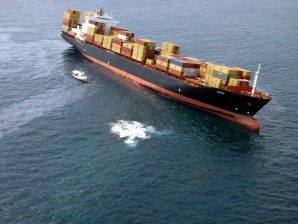Oil slick ship ran aground as captain ‘cut corner’

TAURANGA – The vessel at the center of New Zealand’s worst maritime pollution disaster ran aground because the captain was taking a short cut, the New Zealand government alleged Saturday.
The accusation was made as salvage crews prepared to pump oil from the stricken cargo ship Rena, which ran aground last week.
Anger is mounting in New Zealand over the fuel leak, with popular beaches on the North Island’s east coast coated in oil and off-limits to the public, and more than 1,000 dead and oil-soaked birds recovered.
There were indications Saturday the leak has been stemmed, but the ship’s agent has said the six Filipino crewmembers who are still in New Zealand are being kept at an undisclosed location amid fears for their safety.
Environment Minister Nick Smith said it appeared the Rena hit a reef off the resort area of Tauranga when the vessel was trying to get to port quickly.
Article continues after this advertisement“I can’t confirm that. But it appears from the charts that they were in a rush to get to port, went full bore, cut the corner, and hit the reef,” Smith told TV3’s The Nation programme.
Article continues after this advertisementThe ship’s captain and the officer on navigational watch when the ship ran aground have already been charged with operating a vessel in a manner causing unnecessary danger or risk.
The charge carries a maximum penalty of one year in jail.
Meanwhile, Maritime New Zealand (MNZ) salvage head Bruce Anderson said divers working around the ship reported it was not as stable as earlier believed although observation flights saw no fresh oil leaks on Saturday.
“Divers have indicated the stern is in a precarious situation as a portion of the vessel is still floating in deeper water, while the front of the vessel is firmly grounded on the reef,” Anderson said.
Salvage crews working on board were expected to start pumping oil to a nearby tanker on Sunday.
It is believed there are still 1,346 tons of oil on board the Rena while about 330 tons have leaked into the ocean in an ecologically sensitive area teeming with wildlife, with 88 containers also falling into the water.
Matthew Watson from the salvage company Svitzer told Radio New Zealand a team on a fuel pumping barge half a nautical mile away had been testing equipment to remove the remaining oil.
Their main difficulty was finding a way to heat the fuel, which has cooled to a dense consistency and the ship’s engines no longer have the power to warm it, he said.
On shore, nearly 1,000 dead birds have been recovered and a wildlife facility is caring for 110 injured birds as a volunteer army of 2,000 people were on their hands and knees meticulously cleaning beaches.
“You can’t get machinery in here, for starters. So you’ve got to get people down here on their hands and knees to pick it up. Otherwise no one else is going to do it,” said Wayne Sayers on Papamoa beach.
Team leader David Eddy added: “Initially it was just on the surface, but now we’re going a lot deeper. A couple inches deeper. We’ve found some large clumps of it.”
Compared with some of the world’s worst oil spills, the disaster remains small – the Exxon Valdez which ran aground in 1989 in Alaska dumped 37,000 tons of oil into Prince William Sound.
But it is significant because of the pristine nature of New Zealand’s Bay of Plenty, which contains marine reserves and wetlands and teems with wildlife including whales, dolphins, penguins, seals and rare sea birds.